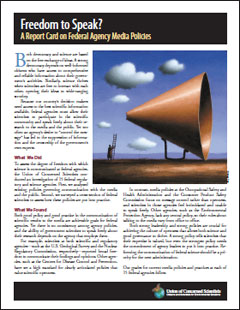Both democracy and science are based on the free exchange of ideas. A strong democracy depends on well-informed citizens who have access to comprehensive and reliable information about their government’s activities. Similarly, science thrives when scientists are free to interact with each other, opening their ideas to wide-ranging scrutiny.
Because our country’s decision makers need access to the best scientific information available, federal agencies must allow their scientists to participate in the scientific community and speak freely about their research to the media and the public. Yet too often an agency’s desire to “control the message” has led to the suppression of information and the censorship of the government’s own experts.
To assess the degree of freedom with which science is communicated at federal agencies, the Union of Concerned Scientists conducted an investigation of 15 federal regulatory and science agencies. First, we analyzed existing policies governing communication with the media and the public. Second, we surveyed a cross-section of federal scientists to assess how these policies are put into practice. Our grades for current media policies and practices at each of 15 federal agencies are summarized in the chart below. Underneath the chart, see a summary of the findings and our proposed solutions.




